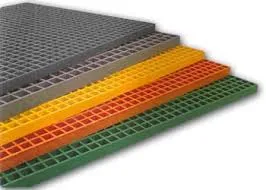loading...
- No. 9, Xingyuan South Street, Dongwaihuan Road, Zaoqiang County, Hengshui, Hebei, China
- admin@zjcomposites.com
- +86 15097380338
- Welcome to visit our website!
frp trench drain
Understanding FRP Trench Drains A Comprehensive Overview
In the realm of drainage systems, trench drains have emerged as a crucial component for effective water management. Particularly in areas prone to flooding or where heavy rainfall is common, these systems play an integral role in preventing water accumulation. Among the various materials used in the fabrication of trench drains, Fiber Reinforced Polymer (FRP) has gained considerable attention, owing to its unique properties and benefits. This article delves into the characteristics, advantages, applications, and installation of FRP trench drains.
What is FRP?
Fiber Reinforced Polymer, or FRP, is a composite material composed of a polymer matrix reinforced with fibers. These fibers are typically made from glass, carbon, or aramid, which enhances the strength and durability of the polymer. FRP is praised for its lightweight nature, resistance to corrosion, and superior mechanical properties compared to traditional materials like concrete or metal. This makes FRP an excellent choice for various construction applications, including trench drains.
Advantages of FRP Trench Drains
1. Corrosion Resistance One of the most significant benefits of FRP trench drains is their exceptional resistance to corrosion. Unlike metal drains, which can rust and degrade over time when exposed to moisture and chemicals, FRP maintains its integrity, making it ideal for industrial environments, chemical plants, and coastal areas.
2. Lightweight and Easy to Install FRP components are considerably lighter than their concrete or metal counterparts. This not only facilitates easier handling and transportation but also simplifies the installation process. Reduced weight can lead to lower labor costs and less equipment needed for installation.
3. Customizable Designs FRP trench drains can be manufactured in various shapes, sizes, and configurations, allowing for customized solutions to fit specific project requirements. Whether for residential landscaping or large-scale commercial applications, FRP offers versatility in design.
4. Durability and Longevity The durability of FRP materials ensures a long lifespan, which translates into lower maintenance costs over time. Their resilience to environmental stressors means that they can withstand harsh conditions, making them a prudent investment in the long term.
frp trench drain

5. Aesthetics FRP can be engineered to mimic other materials, such as stone or concrete, allowing for aesthetic integration into landscaping designs. This feature is particularly valuable in residential areas where visual appeal is a priority.
Applications of FRP Trench Drains
FRP trench drains are suitable for a wide range of applications. They are commonly used in
- Industrial Facilities In locations where chemicals are frequently handled, the corrosion resistance of FRP is critical for safety and maintenance. - Roadways and Parking Lots Their ability to handle heavy loads and prevent flooding makes FRP trench drains an ideal choice for managing stormwater runoff in urban settings. - Swimming Pools and Water Parks FRP trench drains can effectively manage water around recreational water features, ensuring proper drainage while enhancing the overall safety of the area. - Agricultural Areas In farms and greenhouses, these drains help manage excess water, thereby preventing soil erosion and crop damage.
Installation of FRP Trench Drains
The installation process for FRP trench drains involves several key steps
1. Planning Assess the drainage requirements and plan the layout for optimal water flow. 2. Excavation Dig trenches according to the planned layout, ensuring proper depth and level. 3. Base Preparation Create a stable base using gravel or sand to support the trench drain. 4. Placement Position the FRP trench drain sections within the excavated area, ensuring they are aligned and level. 5. Backfilling and Finishing Refill the surrounding area and finish the surface to match the surrounding landscape or pavement.
In conclusion, FRP trench drains offer a modern, efficient, and aesthetic solution for managing water in various environments. With their myriad advantages and versatile applications, they stand out as a superior choice for both commercial and residential projects. Whether you're looking to prevent flooding, protect infrastructure, or enhance landscaping, FRP trench drains are certainly worth considering.
-
The Rise of FRP Profiles: Strong, Lightweight, and Built to LastNewsJul.14,2025
-
SMC Panel Tanks: A Modern Water Storage Solution for All EnvironmentsNewsJul.14,2025
-
GRP Grating: A Modern Solution for Safe and Durable Access SystemsNewsJul.14,2025
-
Galvanized Steel Water Tanks: Durable, Reliable, and Ready for UseNewsJul.14,2025
-
FRP Mini Mesh Grating: The Safer, Smarter Flooring SolutionNewsJul.14,2025
-
Exploring FRP Vessels: Durable Solutions for Modern Fluid HandlingNewsJul.14,2025
-
GRP Structures: The Future of Lightweight, High-Performance EngineeringNewsJun.20,2025
